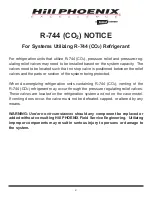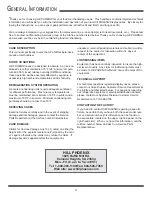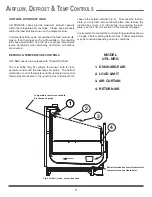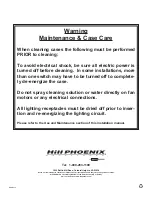
I
NSTALLATION
MOVING CASES
Hill PHOENIX display cases are generally shipped to
stores with casters installed on the base frame. The cast-
ers make the job of moving cases easier for everyone
involved in the shipping and installation process, as well as
reducing the chance of damage from raising and lowering
cases with ”J” bars to place them on dollies, skates or roll-
ers. In most situations, one or two persons can easily
move the case into position.
When the cases arrive at the store, simply roll them on to
the store floor to the proper staging area. Occasionally,
cases are shipped with skid boards attached to help with
stabilization. In these instances, the casters should be
attached after the case is removed from the truck.
Removing the casters is an easy process. Simply flatten
and remove the cotter pins that are holding the casters in
place (Fig. 1). Then lift the case with a “J” bar and slide
the caster assemblies out. The dismantled casters can
now be discarded.
FLOOR PREP
1.
Ask the general contractor if your current copy of the
building dimensions are the most recently issued. Also,
ask for the points of reference from which you should
take dimensions to locate the cases.
2.
Using chalk lines or a laser transit, mark the
fl
oor
where the cases are to be located for the entire lineup.
The lines should coincide with the outside edges of the
case feet.
3.
Leveling is necessary to ensure proper case align-
ment and to avoid potential case damage. Locate the
highest point on the positioning lines as a reference for
determining the proper height of the shim-pack level-
ers. A laser transit is recommended for precision and
requires just one person.
4.
Locate basehorse positions along the chalk line. Spot
properly leveled shim packs at each basehorse loca-
tion.
Fig. 1 Caster assembly
CASTER
W A R N I N G
Be certain that your hands and feet are out of
the way before lowering the case after the
removal of the casters. Failure to do so may
result in serious injury.
▲
J-BAR
LINE-UP & INSTALLATION
Single Case
1.
Roll the case into position. Using a “J” bar , raise the
end of the case (under cross support), remove the
caster assembly and lower the basehorse on to the
shim packs. Repeat on the other end of the case.
2.
Once the basehorse is properly placed on the shim
packs, check the vertical plumb of the case by plac-
ing a bubble level on the rear wall. Add/remove shim
packs as needed. To check the horizontal level, repeat
this process after placing the bubble level on the front
sill.
Multi-Case
1.
Remove any loose items from the cases that may
interfere with case joining (e.g. shipping braces, mirror
assemblies, etc).
Be certain to keep all loose items
close to the case in which they shipped as they will
be used later in the installation process.
2.
Follow the single-case installation instructions (above)
for the
fi
rst case, then position the next case in the line-
up approximately 3’ away. Remove the casters on the
end that is closest to the
fi
rst case.
3.
Apply the foam tape gasket (supplied) and a bead of
butyl or silicone sealant to the end breaker of the
fi
rst
case. From the opposite end, push the second case to
a position that is approximately 6" from the
fi
rst case,
then remove the remaining casters and position case
on the shim packs.
4.
Push the cases tightly together, then lightly bolt them
together through the holes that are provided. Tighten
all the joining bolts until all margins are equal. Be care-
ful not to over tighten.
5.
Repeat steps 3 and 4 of this sequence for all remaining
cases. Be certain to properly level all cases.
5
Summary of Contents for UPL-NRG
Page 2: ...ii...
Page 15: ...APPENDIX A WIRING DIAGRAMS...
Page 16: ......
Page 17: ...NOTES...
Page 18: ...NOTES...



































